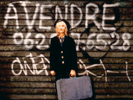A young woman named Magdalena (Isabelle Huppert) retrieves a postcard that had been cast into the wind by her biological mother (Bulle Ogier) from a seaside town in Portugal and discovers that she has a twin sister named Maria. From this seemingly introspective opening premise on identity, connection, and history, Deux diverges into unexpectedly abstract, non-intersecting trajectories that involve a schoolgirl attraction with a fellow classmate, a mother’s wartime romance, a serial killer who leaves a tell-tale rose on the bodies of his victims, a lonely woman who adopts a fox as a household pet. Composed of asequential and dissociated vignettes, the film evokes the baroque tableaux of Sergei Paradjanov, the formalism of Rainer Werner Fassbinder, and fractured surrealism of Luis Buñuel infused with quasi-religious iconography and Actionism of Otto Mühl (most notably, in the image of disemboweled figures such as ornamental cherubs). Werner Schroeter’s latest film is an elegantly operatic, tactile, and voluptuous, but ultimately fractured, opaque, and impenetrable, creating a sensuous and visually dense but also idiosyncratically personal to the point of abstruseness.
Unfortunately, the highly anticipated conversation between critic Gary Indiana and Bulle Ogier turned out to be a rambling, disorganized, and incoherent near monologue by Mr. Indiana who seemed far more interested in usurping the spotlight to articulate his opinions on Deux and Werner Schroeter rather than actually interviewing with Ms. Ogier, opening with his expounded personal theory that the relationships between the estranged mother and twin daughters in Deux represented the relational dynamics between Schroeter’s recently deceased mother, his late muse Magdalena Montezuma, and Schroeter himself…to which Ms. Ogier could only briefly respond in agreement (before Indiana then launched into a second theory on the meaning of the film). Fortunately, Ms. Ogier was able to provide some personal insight into her oeuvre, such as her continued work in stage and screen both in France and in Germany, which led to her association with Schroeter. Another was how her collaboration with Rainer Werner Fassbinder in The Third Generation led to the development of her character in Jacques Rivette’s Le Pont du Nord as a loose sequel to the newly released, imprisoned former activist and revolutionary of the Fassbinder film.
—–
Posted by Gary Indiana on 10/10/05:
I agree with you that my conversation with Bulle Ogier after the screening of “Deux” was very botched, but quite honestly I was not trying to dominate the proceedings. Bulle Ogier and I had worked out beforehand what subjects she preferred to discuss, but we could not easily find our way into them because the Film Society insisted on scheduling this dialogue after “Deux,” a film in which Bulle’s part is minor and doesn’t reflect her range as an actress. The conversation was “opened up” to questions from the audience without consulting either of us, and the translator, who spoke perfectly good French, wasn’t familiar with Bulle’s career, and garbled many of my questions and Bulle’s answers–for instance mistaking “the Situationists” for “the Surrealists”–which in turn created more confusion and frustration among the audience members. Bulle had asked me to “answer for her” about a variety of things, and although I knew this would not go over well, I found myself having to say something simply to keep the auditorium from going into dead silence. We both felt somewhat undermined and just as frustrated as the audience was. It was quite silly to have “Deux” on this particular program in the first place, not that it isn’t a wonderful movie, but it isn’t Bulle’s movie, it’s Isabelle Huppert’s movie. We had hoped to balance the whole program by including Fassbinder’s “The Third Generation,” which is an ensemble film but a better place from which to generate a conversation about art and politics (what we had hoped to have), but even after Barbet Schroeder obtained a subtitled print the Film Society failed to schedule it, though they had agreed to do so. I realize that the audience couldn’t have had any idea of the actual circumstances that combined to make this particular event as flat and tiresome as it was, and it’s understandable that people would blame me for it. I’m sorry people were disappointed. So was I, so was Bulle. These things sometimes just don’t work.
© Acquarello 2008. All rights reserved.
